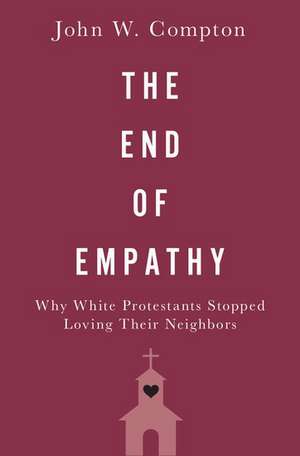The End of Empathy: Why White Protestants Stopped Loving Their Neighbors
Autor John W. Comptonen Limba Engleză Hardback – 8 oct 2020
Preț: 191.70 lei
Preț vechi: 218.13 lei
-12% Nou
Puncte Express: 288
Preț estimativ în valută:
36.69€ • 37.81$ • 30.98£
36.69€ • 37.81$ • 30.98£
Carte disponibilă
Livrare economică 28 ianuarie-03 februarie
Livrare express 28 ianuarie-01 februarie pentru 62.55 lei
Preluare comenzi: 021 569.72.76
Specificații
ISBN-13: 9780190069186
ISBN-10: 019006918X
Pagini: 408
Dimensiuni: 236 x 160 x 36 mm
Greutate: 0.68 kg
Editura: Oxford University Press
Colecția OUP USA
Locul publicării:New York, United States
ISBN-10: 019006918X
Pagini: 408
Dimensiuni: 236 x 160 x 36 mm
Greutate: 0.68 kg
Editura: Oxford University Press
Colecția OUP USA
Locul publicării:New York, United States
Recenzii
Compton seeks to explain support for Donald Trump among American Protestants, suggesting that the empathy religious voters had previously demon-strated for underprivileged groups had been compelled by mainline Protestant churches that, beginning in the 1960s, increasingly lost members to evangelical churches opposing government efforts to more equitably distribute wealth and political power.
Why are white evangelicals so supportive of Donald Trump, when in the past evangelicals were often on the side of progressive social reforms? Many have attempted to answer that question by looking only to the present. In this book John Compton takes a longer view, convincingly arguing that the Religious Right emerged to fill the vacuum left when mainline Protestantism lost its authoritative voice in American public life. This book is required reading for anyone trying to make sense of the contemporary American religious landscape.
As a former pastor who spent my life in the milieu described in John Compton's new book, I read with it with both personal and professional interest. Well-written and energetically researched, The End of Empathy overturned several of my previously settled assumptions, and forced me to see many of my own struggles and perplexities in a new light. Most importantly, it convinced me that evangelical leaders of the Religious Right have not actually been religious leaders; rather, they have been social mirrors, following their white flocks into a form of backlash politics that reflects their racial anxieties and resentments. An important book, especially in this conflicted time.
In this compelling contemporary history, John Compton marshals a wide range of evidence to argue that it is the decline, not the enhanced influence, of religious authority in their day-to-day lives that drives racial resentment and other conservative political characteristics associated with white evangelicals today.
Why are white evangelicals so supportive of Donald Trump, when in the past evangelicals were often on the side of progressive social reforms? Many have attempted to answer that question by looking only to the present. In this book John Compton takes a longer view, convincingly arguing that the Religious Right emerged to fill the vacuum left when mainline Protestantism lost its authoritative voice in American public life. This book is required reading for anyone trying to make sense of the contemporary American religious landscape.
As a former pastor who spent my life in the milieu described in John Compton's new book, I read with it with both personal and professional interest. Well-written and energetically researched, The End of Empathy overturned several of my previously settled assumptions, and forced me to see many of my own struggles and perplexities in a new light. Most importantly, it convinced me that evangelical leaders of the Religious Right have not actually been religious leaders; rather, they have been social mirrors, following their white flocks into a form of backlash politics that reflects their racial anxieties and resentments. An important book, especially in this conflicted time.
In this compelling contemporary history, John Compton marshals a wide range of evidence to argue that it is the decline, not the enhanced influence, of religious authority in their day-to-day lives that drives racial resentment and other conservative political characteristics associated with white evangelicals today.
Notă biografică
John W. Compton is Associate Professor of Political Science at Chapman University and the author of The Evangelical Origins of the Living Constitution.
